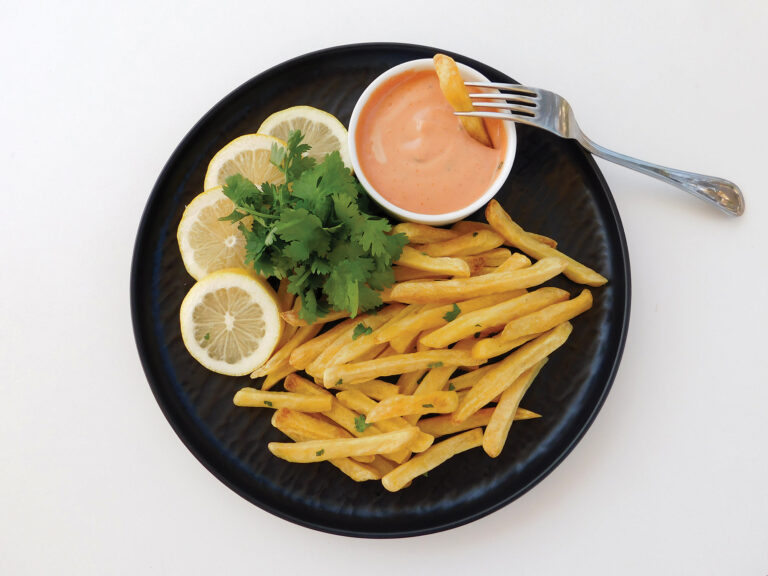I have a confession to make. Food and cooking are the bane of my wife, Jajas and my existence when cruising especially now that we have three kids. Foods expensive. It takes time to prepare, and often, once its on the table, the kids wont eat it. Then theres the cleaning up to do. Food clutters up the lockers on the boat and demands that we carry utensils to eat it. More than one quarter of the interior space below aboard Driver, our 35-footer, is dedicated to its preparation and disposal. Perhaps Jaja and I are food philistines, but eating because we are obliged to means weve become dutifully philosophical.
On our boat, cooking has more in common with compromise than with culinary calculation. Years ago we were sitting in a remote Pacific anchorage thumbing through our paperback-sized cookbook. The fondue recipe in the book sounded too exotic, so we melted some processed cheese in a saucepan, then added beer, because we didnt have any of the white wine or vermouth the recipe called for. While we stirred and it simmered, we popped some popcorn, because we didnt have any bread. When it was ready, we impaled the popcorn pieces on regular forks (not the fondue variety) and tucked in. The result of this experiment was a viable alternative for underwater epoxy.
I know dont tell me we couldve baked our own bread. Its my opinion, however, that making bread is the windward leg of food preparation: There is too much rolling and pounding involved. Dont misunderstand; Jaja and I used to make bread. We followed the recipes in a quaint volume written by a Zen monk from California. He lectured that to make good bread you had to be introspective, full of vital energy, and able to relay an inner calmness to the bread through your fingertips. We abandoned making bread soon after our first child was born.
Cooking would probably be more fun if we didnt have to do it daily. Jaja and I are, without a doubt, prime candidates for instant canned meals and prepackaged dinners. But wed rather eat plain white rice every night than cans of beef stew or chicken chow mien. Why is it that the fancier a canned or packaged meal is, the more artificial it tastes?
Whether at sea or at anchor, we prefer to savor real food. When we have access to a market, we buy fresh vegetables and meat, but we keep the standard canned-food stand-bys aboard as well. What cruising boat would be complete without a supply of canned corned beef? Jaja argues that manufacturers of canned meat products have one product and two labels one for people and one for pets. She makes derogatory barking sounds whenever I fish a can of corned beef out of the locker and snap off the little key. I eat it because theres something about that trapezoidal lump of animal composite that reminds me of my youth, when the goal was to absorb as much protein with as little fuss as possible. Legumes certainly qualify as real food, but whenever weve made lentils or split peas theyve tasted like wood chips. Fortunately, protein comes in many forms.
We have no refrigeration, so when fresh supplies arent available, we try to combine natural ingredients that keep well aboard like potatoes, onions, garlic, rice, and pasta with canned staples such as tomatoes, condensed soups, water chestnuts, corn, and tuna. Simple, one-pot meals are our specialty theyre easier to eat and its easier to clean up afterwards.
Complicated food preparation may not be high on our list of priorities, but we manage to make some good, satisfying, simple meals aboard Driver. At mealtime, we always offer the kids two choices: take it, or leave it! The following one-pot recipes, which we make when no fresh stores are available, are a hit with both the kids and us.
Doldrums Chowder
(For when the fish aren’t biting)
2 onions, chopped
2 potatoes, diced
Garlic to taste, minced
3 tablespoons olive oil
1 16-ounce can tuna
1 8-ounce can mussels
1 can evaporated milk (or cream)
Water, as needed
Salt and pepper to taste
In a large soup pot, sauté the vegetables in olive oil. Add the seafood and milk or cream; thin with a little water if desired. Simmer until milk/cream is reduced and thickened. Salt and pepper to taste.
Direction Stew
(Named after our first boat — an old stand-by!)
2 onions, sliced
2 potatoes, cubed
Garlic to taste, minced
3 tablespoons olive oil
1 can stewed tomatoes
1 can corned beef
1 cup water (more as needed)
2 beef bouillon cubes
In a large soup pot, sauté the vegetables in olive oil. Add remaining ingredients, bring to a boil, and simmer for one hour, adding more water if necessary.
Passage Paste
(The kids especially love this one)
2 cups macaroni
1 can Campbell’s Cream of Mushroom or Cream of Chicken soup
1 16-ounce can tuna
½ to 1 cup water
Salt and pepper, to taste
Precook macaroni in a large pot. Drain well, then add remaining ingredients. Stir to combine, then heat on medium flame until hot and until flavors are combined. Season to taste with salt and pepper.
Midnight Tuna
(A quickie.)
1 can tuna
1 fork
Open can. Drain. Eat with fork. (Mayonnaise and pepper optional).







